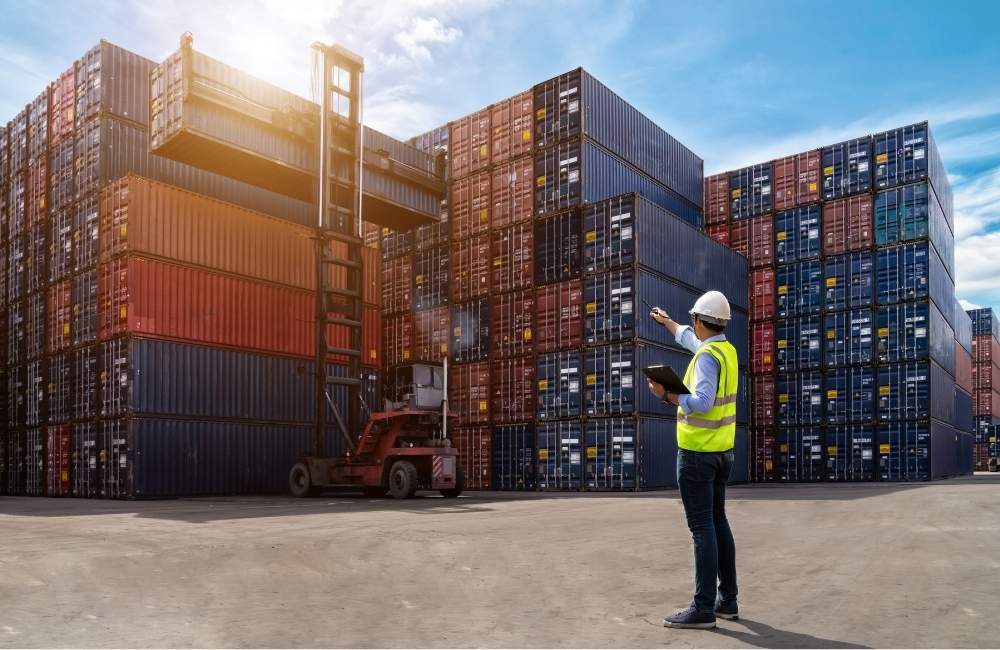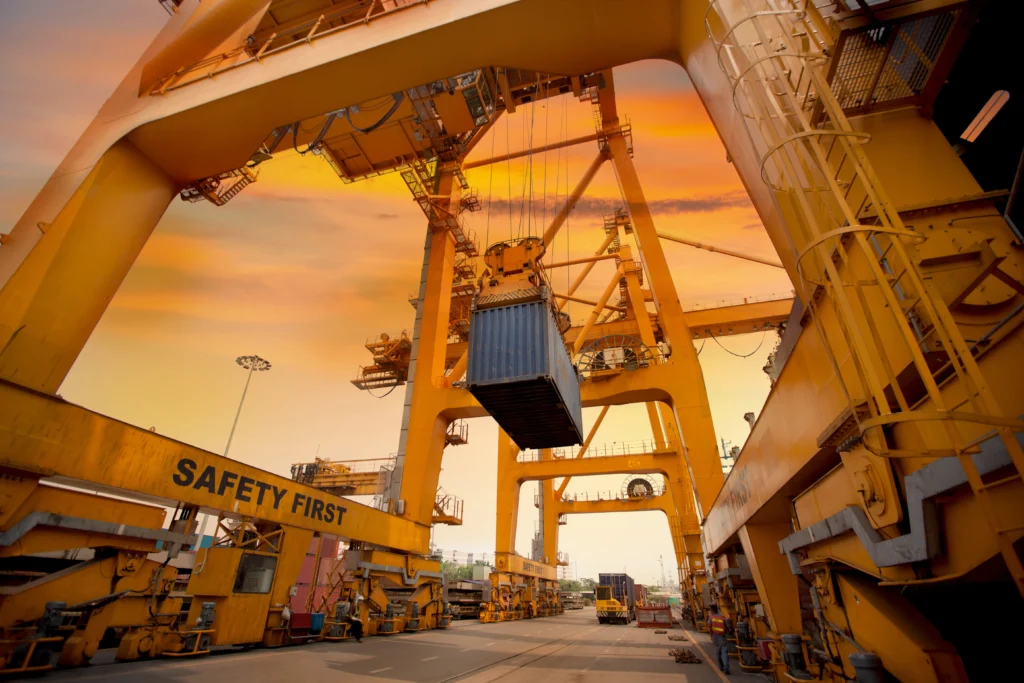Bulk freight logistics is the engine behind large-scale transportation, allowing businesses to move massive quantities of goods efficiently and cost-effectively. In a high-volume trade hub like New York City, bulk freight logistics helps keep operations smooth and supply chains intact. With industries ranging from fashion to food service relying on timely cargo movement, the need for reliable freight forwarding in NYC has never been greater.
Here are five reasons why bulk freight logistics is essential for NYC businesses and how it powers the city’s commercial heartbeat.
Table of Contents
Key Takeaways
✔ Bulk freight logistics enables NYC businesses to move large volumes of goods efficiently and cost-effectively.
✔ Choosing the right freight forwarding in NYC partner ensures reliable transportation and streamlined operations.
✔ Proper customs clearance in NYC prevents costly delays and keeps international shipments on schedule.
✔ Bulk freight reduces per-unit shipping costs by maximizing cargo space and minimizing repacking needs.
✔ Industry-specific logistics support helps meet safety, compliance, and cargo handling standards.
✔ Step-by-step shipment preparation improves accuracy, timing, and regulatory compliance.
✔ A strong supply chain forwarding in NYC strategy boosts delivery reliability and long-term growth.
What Is Bulk Freight Logistics?
Bulk freight logistics refers to the management and transportation of large quantities of unpackaged goods—such as grains, coal, liquids, or raw materials—moved by land, sea, or air.
Unlike standard parcel shipping, bulk freight focuses on efficiency and volume, using specialized carriers and infrastructure to handle oversized or high-weight loads. This system is critical for industries that rely on steady, large-scale deliveries to keep production running and shelves stocked.
5 Reasons Why NYC Businesses Need Bulk Freight Logistics
1. Increases Efficiency for High-Volume Operations
Bulk freight logistics makes it easier for NYC businesses to move large shipments without delays. Companies that handle daily high-volume orders need a system that works fast and reliably. With the support of logistics and freight forwarding in NYC, operations stay on track and scalable.
How Bulk Freight Streamlines Daily Operations
- Reduces Handling Time: Bulk freight uses specialized tools like silos, chutes, or pumps to load and unload faster. This cuts down on manual labor and speeds up delivery at both ends of the route.
- Maximizes Cargo Space: Carriers are designed to hold as much material as possible, leaving little wasted space. Businesses using cargo forwarding services in NYC benefit from lower transport costs and higher efficiency.
- Supports Consistent Delivery Schedules: Bulk freight services operate on fixed schedules with streamlined routes. This reliability is essential for industries in NYC that depend on timely freight shipping in NYC to meet demand.
2. Reduces Transportation Costs
Bulk freight logistics offers real savings for businesses that move large amounts of goods regularly. Instead of paying for multiple small shipments, companies can consolidate freight and reduce per-unit costs. With the right freight forwarding in NYC, these savings add up quickly.
How Bulk Freight Reduces Transportation Costs
- Lowers Cost Per Unit: Larger shipments reduce the cost of transportation per item. This is especially valuable in a city where supply chain forwarding in NYC helps businesses stay competitive.
- Minimizes Repacking and Material Waste: Bulk loads use fewer containers and less packaging. Companies relying on cargo forwarding services in NYC benefit from lower packaging costs and less landfill waste.
- Optimizes Carrier Selection: Freight forwarders choose the best carriers based on route, capacity, and price. In fast-moving markets like NYC, access to efficient freight shipping in NYC partners makes a big difference.
3. Simplifies International Trade
Bulk freight logistics is a powerful tool for companies importing or exporting products across borders. It makes customs, documentation, and coordination easier to manage. With help from experts in freight forwarding in NYC, businesses can grow globally without added stress.
How Bulk Freight Makes Global Shipping Easier
- Streamlines Customs Processes: Experienced forwarders know how to handle customs clearance in NYC, avoiding delays and fees. They manage compliance from start to finish so shipments move smoothly through ports.
- Ensures Proper Documentation: International shipping requires specific paperwork, from bills of lading to certificates of origin. Freight forwarding in NYC providers prepare and review all documents to avoid rejections or fines.
- Manages International Regulations: Every country has different shipping rules. Logistics and freight forwarding in NYC includes the knowledge needed to navigate these changing regulations safely and legally.
4. Improves Supply Chain Reliability
Consistent freight flow is essential for NYC businesses trying to meet tight schedules. Bulk freight logistics builds more stable and reliable supply chains by minimizing delays. Companies that use freight shipping in NYC are better equipped to keep inventory moving.
How Bulk Freight Improves Supply Chain Reliability
- Reduces Inventory Gaps: Bulk deliveries keep warehouses stocked and production on track. Supply chain forwarding in NYC helps avoid the stress of last-minute shortages.
- Builds Better Vendor Relationships: When deliveries are on time, vendors trust the process. Working with reliable freight forwarding in NYC providers keeps the entire supply chain running smoothly.
- Minimizes Weather and Traffic Disruptions: NYC’s busy streets and unpredictable weather can cause shipping delays. Cargo forwarding services in NYC plan around these risks to ensure on-time delivery.
5. Supports Industry-Specific Needs
Different industries have different freight needs—and bulk logistics adapts to those demands. Whether it’s temperature-sensitive items or oversized equipment, customized freight solutions are available. NYC businesses benefit from working with logistics and freight forwarding in NYC teams who understand their industries.
How Bulk Freight Adapts to Specialized Industries
- Handles Sensitive Materials Safely: Pharmaceuticals, chemicals, and perishables need special care during transit. Freight forwarding in NYC providers offer climate control, secure containers, and regulated handling.
- Fits Oversized Or Irregular Goods: Not everything fits in a box—especially in industries like construction or events. Cargo forwarding services in NYC arrange for flatbeds and other tools to move large items safely.
Follows Industry Compliance: Every sector has rules—FDA, OSHA, DOT—that must be followed to the letter. Supply chain forwarding in NYC ensures shipments meet these standards while staying on schedule.
How to Choose the Right Freight Forwarder in NYC
The 3PL industry has experienced steady growth, with revenue rising at an annual rate of 4.8% over the past five years, including a 6.8% jump in 2024. That said, choosing the right freight forwarder is critical for NYC businesses that rely on the smooth, timely movement of goods. A good partner goes beyond transportation—they help manage paperwork, reduce risk, and streamline operations.
Here’s what to look for when evaluating freight forwarding in NYC:
1. Look for Industry-Specific Experience
Not all freight forwarders understand the unique needs of every sector. A company that specializes in fashion may not be equipped to handle pharmaceutical-grade cargo. Businesses should prioritize freight forwarding in NYC firms with a proven track record in their industry to avoid costly learning curves.
2. Evaluate Their Customs Clearance Expertise
With 70% of American consumers now preferring real-time tracking over contacting customer service about shipment issues, visibility and efficiency have become non-negotiable. Smooth international shipping depends heavily on proper customs processing, making it essential to partner with a forwarder who understands the intricacies of customs clearance in NYC. A forwarder with in-depth knowledge can prevent delays, penalties, and even shipment rejection.
3. Check Network and Carrier Access
A well-connected freight forwarder can offer competitive rates and faster transit times. Strong relationships with carriers, port authorities, and warehousing providers give clients more flexibility and options. This is especially important when dealing with high-volume cargo forwarding services in NYC or urgent shipments.
4. Ask About End-to-End Logistics Support
The best freight partners offer more than transportation—they manage warehousing, packaging, and last-mile delivery too. This kind of full-service logistics and freight forwarding in NYC ensures smoother coordination and fewer handoffs. It’s especially valuable for businesses trying to centralize supply chain responsibilities.
5. Review Track Record for On-Time Delivery
Timeliness can make or break business relationships. Ask about performance metrics, missed delivery rates, and how they handle unforeseen delays. A forwarder with consistent freight shipping in NYC success is more likely to meet the fast-paced demands of the local market.
6. Confirm Transparency and Communication Standards
Effective communication builds trust and reduces confusion during shipment cycles. Look for freight forwarders that offer real-time updates, clear pricing, and accessible support teams. Strong communication is a must-have when navigating complex supply chain forwarding in NYC operations.
How Customs Clearance in NYC Actually Works
Customs clearance is a vital part of international freight logistics, especially in a global trade hub like New York City. Whether importing or exporting, businesses must meet strict regulatory requirements to ensure their cargo reaches its destination on time. Understanding how customs clearance in NYC functions can help businesses avoid delays, fines, and logistical headaches.
1. Filing Required Import and Export Documents
Every shipment entering or leaving NYC needs accurate documentation to clear customs. This includes commercial invoices, packing lists, bills of lading, and certificates of origin. Businesses often rely on freight forwarding in NYC services to ensure these documents are complete and submitted properly.
2. Classification and Valuation of Goods
Customs officers use Harmonized System (HS) codes to classify goods and determine duties and taxes. Incorrect classification can lead to overpaying or legal issues. Many cargo forwarding services in NYC provide classification support to help companies get it right the first time.
3. Compliance With U.S. Customs and Border Protection (CBP) Regulations
All imports must meet CBP guidelines for safety, labeling, and admissibility. Failure to comply can result in cargo holds, rejections, or even seizure. A reliable logistics and freight forwarding in NYC partner will understand CBP rules and help ensure full compliance.
4. Paying Duties, Taxes, and Fees
After assessment, importers are responsible for paying duties and other government-imposed charges. These fees vary based on product type, origin country, and trade agreements. Supply chain forwarding in NYC companies often manage this payment process on behalf of their clients to speed up clearance.
5. Coordination With Customs Brokers
Licensed customs brokers act as intermediaries between importers and government agencies. They submit paperwork, communicate with customs officials, and handle classification or valuation disputes. Many freight shipping in NYC providers either employ brokers in-house or work with trusted partners to streamline the process.
6. Inspection and Release of Cargo
In some cases, CBP randomly or selectively inspects shipments for compliance or risk assessment. Once cleared, goods are released for delivery or storage. Efficient customs clearance in NYC depends on having a responsive team that can resolve issues quickly and keep the cargo moving.
How to Prepare a Bulk Freight Shipment
Getting a bulk freight shipment ready involves more than loading cargo onto a truck or container—it requires detailed planning, proper documentation, and careful coordination. Businesses in NYC depend on accuracy and speed, making preparation a critical stage in the shipping process. Here’s a clear breakdown of the steps involved:
1. Assess Cargo Type and Volume
The first step is to identify what kind of cargo is being shipped and how much of it is moving at once. Dry goods, liquids, oversized equipment, and fragile materials all require different handling strategies. Most cargo forwarding services in NYC use this assessment to determine the best transport method and equipment.
2. Choose the Right Packaging and Containers
Bulk freight typically avoids standard boxed packaging, but that doesn’t mean protection isn’t needed. Depending on the shipment, options may include drums, tanks, pallets, or bulk bags. Professionals in freight shipping in NYC help businesses select containers that meet both safety and regulatory requirements.
3. Prepare Documentation Early
Shipping delays often stem from missing or incorrect paperwork. Required documents may include a bill of lading, commercial invoice, packing list, and in international cases, customs paperwork. Logistics and freight forwarding in NYC providers usually handle document preparation to reduce errors and processing time.
4. Coordinate Pickup and Loading Schedule
Bulk freight often involves specialized vehicles, like flatbeds or tankers, and may need advanced scheduling to avoid warehouse congestion. Companies should align internal availability with carrier timelines. This is where supply chain forwarding in NYC experts step in to coordinate smooth loading without downtime.
5. Verify Compliance With Local and International Regulations
From weight limits to hazardous material declarations, there are rules that must be followed at every stage of the shipment. Non-compliance can result in delays, penalties, or worse—shipment rejection. Businesses typically rely on customs clearance in NYC teams to check boxes before the cargo moves.
6. Track and Communicate Shipment Status
Once the freight is en route, real-time updates help keep teams informed and ready to receive the shipment. Good freight partners provide access to tracking systems or dedicated account managers. Leading freight forwarding in NYC firms make communication a priority, helping clients stay ahead of potential disruptions.
Frequently Asked Questions (FAQs)
What’s the difference between LTL and bulk freight shipping in NYC?
Less-than-truckload (LTL) shipping is ideal for small shipments that don’t require a full trailer, while bulk freight shipping handles large, unpackaged, or high-volume cargo. Businesses in NYC often use bulk freight for materials like liquids, grain, or construction supplies that move in large quantities. Many companies turn to freight shipping in NYC providers to determine the most cost-effective method based on cargo size and destination.
Can bulk freight logistics be used for local NYC deliveries?
Yes, bulk freight isn’t limited to international or long-haul shipments—it can also be used for regional and intra-city transport. NYC businesses use cargo forwarding services in NYC to move goods between boroughs, ports, and local warehouses efficiently. This is especially helpful for construction sites, manufacturers, and food suppliers needing high-volume deliveries within city limits.
Are there eco-friendly options for bulk freight forwarding in NYC?
Absolutely. Many freight forwarding in NYC companies now offer sustainable shipping options like fuel-efficient vehicles, carbon offset programs, and minimal-waste packaging for bulk freight. These efforts help businesses reduce their environmental impact while maintaining cost-effective logistics.
What happens if a bulk shipment gets delayed at the port?
If a shipment is delayed, freight forwarders will coordinate with customs, carriers, and warehouse teams to resolve the issue quickly. Delays can result from documentation errors, inspections, or congestion, so working with a knowledgeable customs clearance in NYC provider is key. They help ensure delays are minimized and goods are released as soon as possible.
Can freight forwarding companies help with warehouse storage in NYC?
Yes, many logistics and freight forwarding in NYC providers offer warehousing as part of their services. These include short-term and long-term storage options, inventory management, and even temperature-controlled environments. It’s a valuable solution for businesses managing high-volume or seasonal goods that need flexible storage near distribution points.

Streamline Bulk Freight with 3PL Logistics By Best in NYC
Take the stress out of shipping with 3PL Logistics By Best, a trusted partner for businesses that need reliable bulk freight logistics in New York City. From navigating customs clearance in NYC to coordinating end-to-end freight forwarding in NYC, our experienced team handles every detail with precision. Whether you’re scaling operations or managing time-sensitive cargo, 3PL Logistics By Best delivers tailored solutions that keep your supply chain moving.

